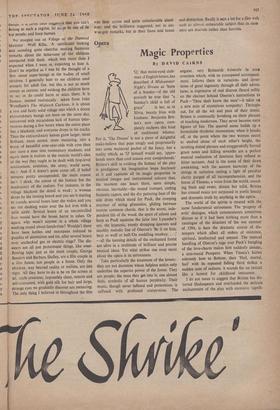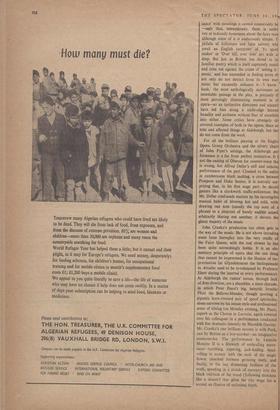Opera
Magic Properties
CAIRNS By DAVID
`Q,' that moist-eyed club- man of English letters, has described A Midsummer Night's Dream as 'born of a Sunday—if the old proverb be true that "a Sunday's child is full of grace" . in her, as in Silvia, beauty lives with kindness.' Benjamin Brit- ten's new opera com- pletely eschews this kind of traditional whimsy.
For it, The Dream' is not a piece of delightful make-believe that pops snugly and proprietarily into some waistcoat pocket of the fancy, but a reality which, as 'Cr himself would say, 'appre- hends more than cool reason ever comprehends.'
Britten's skill in evoking the fantasy of the play is prodigious; his imagination leaps fearlessly at it and captures all its magic properties in musical images and instrumental colours that, the moment one hears them, seem simple, obvious, inevitable—the muted trumpet, cutting fantastic capers, and the dry pattering beat of the side drum which stand for Puck, the creeping murmur of string glissandos, gliding between remote common chords, that is the secret, inde- pendent life of the wood, the spurt of celeste and harp as Puck squeezes the juice into Lysander's eye, the hypnotic, evenly dropping quavers and stealthy melodic line of Oberon's 'Be it on lion, bear or wolf or bull/On meddling monkey. . . —all the teeming details of the enchanted forest are alive in a multitude of brilliant and precise musical ideas. Yet what strikes one even more about the opera is its seriousness.
Take particularly the treatment of the lovers: they are not dummies whose helpless antics only underline the superior power of the forest. They are people; the mess they get into is, one almost feels, symbolic of all human perplexity. Their music, though never inflated and pretentious, is suffused with profound compzssion. The
angular. very Brittenish leitmotiv in eves crotchets which, with its syncopated accompani- ment, follows them in variations and inver- sions of great ingenuity through all their adven- tures, is expressive of real distress (heard softly on the clarinet behind Oberon's instructions to Puck—'Thou shalt know the man'—it takes on a new note of mysterious sympathy) Through- out, for all the wit and pace of their music; Britten is continually lavishing on them phrases of touching tenderness. They never become mere figures of fun. The quarrel scene builds up a formidable rhythmic momentum; when it breaks off, at the point where the two women resort to studied abuse of each other's height, the strutting dotted phrases and exaggeratedly formal grace notes and falling sevenths are a perfect musical realisation of feminine fury refined to bitter sarcasm. And in the scene of their dawn awakening, with the austere harmony of the strings in imitation casting a light of peculiar clarity purged of all incomprehension, and the horns of Theseus, a voice from the world, sound- ing fresh and sweet, distant but solid, Britten has created music not surpassed in poetic beauty and dramatic truth by anything in the opera.
The world of the spirits is treated with the same fundamental seriousness. The 'progeny of evils' dialogue, which commentators sometimes discuss as if it had been nothing more than a catalogue of the disasters of the wet summer of 1594, is here the dramatic source of dis- tempers which affect all orders of existence, spiritual, intellectual and sensual. The musical handling of Oberon's rage over Puck's bungling of the love-charm makes him suddenly sinister, a non-moral Prospero. When Titania's fairies solemnly bow to Bottom, their 'Hail, mortal, hail' with its repeated falling third strikes a sudden note of sadness; it sounds for an instant like a lament for childhood innocence.
I do not mean to suggest that Britten has dis- torted Shakespeare and overloaded the delicate enchantment of the play with excessive 'sign& eance' with meanings it cannot conceivably he —only that, miraculously, there is nothik coy or tediously homespun about the fairy mus although some of it is audaciously simple. Ti pitfalls of folksiness and false naivety wh' await an English composer of 'Ye spot snakes' or 'Over hill, over dale' are wide a deep. But just as Britten has dared to to familiar poetry which is itself supremely musi and cries out against the crime of 'setting it music,' and has succeeded in finding notes th not only do not detract from its own wor music but uncannily enhance it- know bank,' the most anthologically sacrosanct ar unsettable passage in the play, is precisely it most piercingly illuminating' moment in tk opera—so an instinctive directness and sinceri have led him along a knife-edge betwe banality and archness without fear of stumbli into either. Some critics have strangely di covered examples of both in the opera; there a trite and affected things at Aldeburgh, but the do not come from the work.
For all the brilliant playing of the Englis Opera Group Orchestra and the silvery char of John Piper's settings, the Aldeburgh pe formance is a far from perfect realisation. It not the casting of Oberon for counter-tenor th is wrong, but Alfred Deller's stiff and mincin performance of the part. Cloaked to the ankle in cumbersome black sacking, a cross betwee Prospero and Duke Senior, it is scarcely sur prising that, in his first stage part, he should gesture like a clockwork traffic-policeman. Bu Mr. Deller confounds matters by his incorrigibl musical habit of blowing hot and cold, with drawing one note (usually the top note of a phrase) to a pinpoint of barely audible sound arbitrarily blaring out another; it shivers the glassy majesty of the music.
John Cranko's production too often gets in the way of the music. He is not above intruding some lame horseplay into the very cradle of the Fairy Queen; with the real clowns he has been quite astonishingly feeble. It is an ele- mentary principle of opera that the one thing, that cannot be improvised is the illusion of im-; provisation (at Glyndebourne the harlequinade in Ariadne used to be re-rehearsed by Professor Ebert during the interval at every performance). At Aldeburgh the rustics' scenes, through lack of firm direction, are a shambles, a mere charade, in which Peter Pears's big, babyish, lovable Flute the Bellows-Mender, though sporting a gigantic horn-rimmed pair of spoof spectacles, alone survives by his innate style and professional 1 sense of timing (on Monday evening, Mr. Pears, superb as the Chorus in Lucretia, again towered over his colleagues in a performance conducted with fine dramatic intensity by Meredith Davies). Mr. Cranko's one brilliant success is with Puck, cast by Britten as a boy-acrobat—an imaginative masterstroke. The performance by Leonide Massine II is a firework of enthralling move- ment—tumbling, capering, jack-knifing, head- rolling in ecstasy with the stalk of the magic flower clenched between grinning teeth; and finally, to the last drumming fanfares of the work, speeding in a streak of mercury into the black oblivion of the wood (`following darkness like a dream') that gives the tiny stage for a second an illusion of unlimited depth.





















 Previous page
Previous page